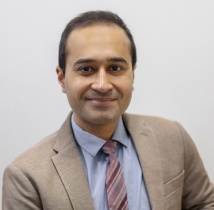Sonil Nanda, PhD
Assistant Professor and Canada Research Chair (Tier 2) in Clean Agricultural Technology and Energy

Related information
Email: sonil.nanda@dal.ca
Phone: 902.843.0997
Mailing Address:
Agricultural Campus
PO Box 550
Truro, NS, B2N 5E3
- Waste-to-energy biorefinery technologies
- Next-generation biofuels and biochemicals
- Subcritical and supercritical water gasification
- Densification, Torrefaction, Carbonization, Pyrolysis and Liquefaction
- Delignification, enzymatic saccharification and fermentation
- Lignocellulosic biomass, biogenic wastes, biofuels, biochar and activated carbon
Education
- Ph.D. (Biology); York University, Toronto, Ontario, Canada
- M.Sc. (Applied Microbiology); Vellore Institute of Technology – VIT University, Vellore, Tamil Nadu, India
- B.Sc. (Microbiology – Honors with Distinction); Odisha University of Agriculture and Technology, Bhubaneswar, Odisha, India
Research Interests
Dr. Nanda’s research program explores unique waste-to-energy biorefinery technologies to convert low-value waste streams (e.g., agricultural and forestry biomass, municipal solid waste, food processing wastes, industrial effluents, livestock manure and polymers) into next-generation biofuels (e.g., biohydrogen, biomethane, bioethanol, biobutanol, bio-oil, biochar and biomass pellets) and industrial bioproducts (e.g., cellulose, lignin, biochar, activated carbon and biochemicals). Through cutting-edge research, his program enables clean and scalable process development to transform diverse biowastes into bioenergy products with technology readiness and adaptability for commercialization. His program targets innovative thermochemical technologies torrefaction, carbonization, pyrolysis and liquefaction), hydrothermal technologies (subcritical and supercritical water gasification) and biological technologies (saccharification, fermentation and anaerobic digestion) processes to efficiently valorize biogenic wastes into high-value biofuels, biochemicals and bioproducts for viable applications. Dr. Nanda’s research program engages knowledge users and collaborators from academia, bioresource sectors, cleantech industries and resource recovery facilities to drive bioenergy innovation to market and support Canada’s mandates the Net-Zero Challenge, decarbonization, clean energy security and circular bioeconomy.
Teaching
Dr. Nanda’s teaching and training strategy is based on the “learning by doing” approach where students learn better as they practice and develop career-ready skills. He implements strategies such as technology-enhanced, cooperative and work-integrated learning, guest lectures, multimedia, presentations and written reports. He encourages critical and systems thinking, teamwork and analytical reasoning to augment the problem-solving skills of the students. His philosophy is built on equity, diversity, inclusion and accessibility to prepare students as forward-thinkers and cross-disciplinary team players and create innovations in the circular bioeconomy, bioresources and cleantech sectors.
Courses
‚Ä¢¬Ý¬Ý¬Ý Bioresource Systems Analysis (APSC 2002)
‚Ä¢¬Ý¬Ý¬Ý Introduction to Statistics (STAA 2000)
